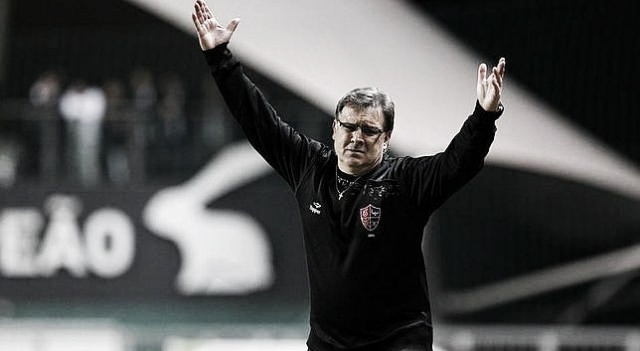“Tata” was a mainstay in the success of the clubs of the 80’s and early 90’s for La Lepra. He was the man that was able to carry out young Bielsa’s concepts and interpret them the best on the pitch. So much so was his ability to synchronize with a man aptly nicknamed “El Loco”, that he eventually became his assistant. At this stage, the kid that made his debut at 17 years of age against Platense was being groomed a one of the most important footballing minds around. He was the man in the heart of the midfield and the emotional sparkplug for Bielsa’s title-winning sides back then. With 505 matches playing for the red and black half of Rosario he was the top choice by a landslide, to say the least.
“I feel identified with the style of football Barcelona play. I am an admirer of the work that Guardiola did. It’s the style I like the most. The respect for the ball, they play the ball from the back,the possession, the triangulations. The pass is the main premise of football.”- Gerardo Martino on FC Barcelona
Now he has the opportunity to become the coach of one of the best squads of the past decade over at Can Barça. He is no stranger to being wanted in Europe, no need to go any further that just this past June when the Madrid press were pointing out that there were negotiations going on to bring in Martino after Jose Mourinho decided to go to Chelsea once again. Martino was also rumored to take over as Colombian national team coach, before they decided to go with José Pekerman. There was also a concerted effort on the part of Santos to obtain the services of the Argentine coach.
While his teacher was about offering up the most complex answer about any subject, Martino was more about simplicity. How simple? Well he doesn’t have an agent. Martino negotiates contracts himself and if all the speculation is correct, he will do the same in the coming hours with Andoni Zubizarreta.
COACHING CONCEPTS
One of the key decisions in Gerardo Martino's career was back in 1991 to return from a four-month stint at Tenerife in Spain to join Newell’s once again in order to help them out in the Argentine final. He was also there in the Copa Libertadores final in 1993 when they finally succumbed to Telê Santana’s legendary São Paulo side. For him, the basis of winning to have “good players”; sounding Cruyff-like simple, right for Barcelona fans when he says that. He understands that and he is able to adapt to the players he has at his disposal as well as to the conditions around him.
“One of the positives of Tata is his ability to adapt to the idiosyncrasies of the country were he is living in,” said Martino’s fitness coach Elvio Paolorrosso in an interview with Catalan radio station RAC1. “When he was in Paraguay, he adapted to the players and their way of living.”
Yet many see him as that his greatest virtue compared to Marcelo Bielsa. He has a open line of communication with his players “especially the players that do not start”.
He has the manic habits of a Bielsa and the non-stop work rate of a Guardiola. He is also a nut for tactics and finding a way to see his players excel within a theory that puts into perspective the qualities and shortcomings of his side.
Tactically he believes in high lines and pressure. He is adamant about constant movement from all the players. He is a believer in playing the ball from the back. Everyone from the goalkeeper to the point man (or false nine) will be involved in the transportation process into the offensive end of the pitch.
His teams were either compact like the Libertad and Cerro Porteño title winning sides of last decade, the combative Paraguayan national side that was able to grind their way to the final of the Copa América or a Newell’s side that was filled with flair and attractive attacking football.
The more limited they were on offense, the more he demanded of them to press in the middle and find the ball at all costs. Case and point, look at Paraguay’s 2011 Copa América side that really was one of the most limited sides he fielded, yet they found a way to get to the final of that tournament against Uruguay.
If there is one thing that he differs compared to Bielsa and Guardiola is that he understands that there is a need for flexibility. He is not so rigid as his teacher and at the same time will not go into the tinkering that Guardiola at times has done in the sake for perfecting and making his side even more dynamic. He understands that tactics have to be molded to the players available instead of using a system. He also understands that when to push, when to pull and when to ease off. That was always important in his relationship with his players, unlike Bielsa who only knew of one way to coach and rarely ever got away from that script.
All those practice sessions as well as minutes speaking to Bielsa were molding him into a very good player that got to see an occasional cap with Argentina, but little did he know that as soon as he started to sink his teeth into the coaching ranks in places like Almirante Brown de Arrecifes in 1999 then Platense and Instituto de Córdoba, his path would set him up with a stretch run in Paraguay that helped him make a name for himself.
"I can’t take responsibility for everything that is said. They say I signed something, so bring it. Put it on the table and I will tell you if it is my signature or not. I know the truth." - Gerardo Martino on signing a pre-contract with Boca Juniors
As a matter of fact, Paraguay were a penalty kick away from knocking out Spain from the World Cup. At least that is what many saw in that Paraguay side that fought until the bitter end in South Africa.
When he took over the Paraguayan national team, he started a revolution of sorts. It was a national team that was on the wrong side of 30 for the most part and several of the players that were part of the Olympic silver medal side know it was time to do something.
The Newell’s Renaissance
When Marcelo Bielsa decided not to take over in Rosario, the next logical choice was to go to his best pupil. Martino decided to take on this project as Newell’s found themselves fighting to avoid relegation after a 19th place finish. Martino had not had a thing to do with this beloved “Ñuls” since he was last at the club back in 1995 when he fell out for a second time with then club president, Eduardo López.
"I don’t know if Argentina is ready to remember a team that does not win (a title). Here you have to win." - Gerardo Martino on the state of Argentine football
When he arrived at Newell’s he was able to help bring back to prominence players like Gabriel Heinze, Maxi Rodríguez, Lucas Bernardi and Ignacio Scocco. All four of these players were pondering retirement prior to Martino’s arrival in Rosario. The case with Scocco was well documented and in a span of a year Scocco went from failed goalscorer from Mexico into the hottest striker in the transfer market this summer.
With these players along with other players that were that found their careers in limbo such as Diego Mateo, Maxi Urruti, Nahuel Guzmán amongst others were placed in a healthy environment and were placed in a system where their talents flourished; making all of these players a fundamental part in creating the best offensive team in the Argentine league last year as well as one of the top defenses in the process.
There were moments when the "Bielsist" in Martino did come out, especially when his squad seemed to run out of gas in the tail end of the season while playing on three fronts. The constant pressure demanded and the excrutiaing efforts implemented saw this squad compromised in matches that were on paper extremely accessible. His changes in practice and tactics allowed for Newell's to find another gear and obtain the results that they needed to win their seventh league title and expand Martino's legacy at the club.
What makes him a candidate for the job at Barcelona is that he is aware that trophies enhance memories. He is aware that there have been great teams in the past that have played great football, but never earned the titles to show for their style. When asked about the possibility of no winning a title despite being the most entertaining team in Argentine football, his answer was simple and social. "I don't know if Argentina is ready to remember a team that does not win (a title)," said Martino. "Here you have to win."
If he gets the chance to be the head coach at Barcelona, I strongly believe that he can use that phrase there as well.










































